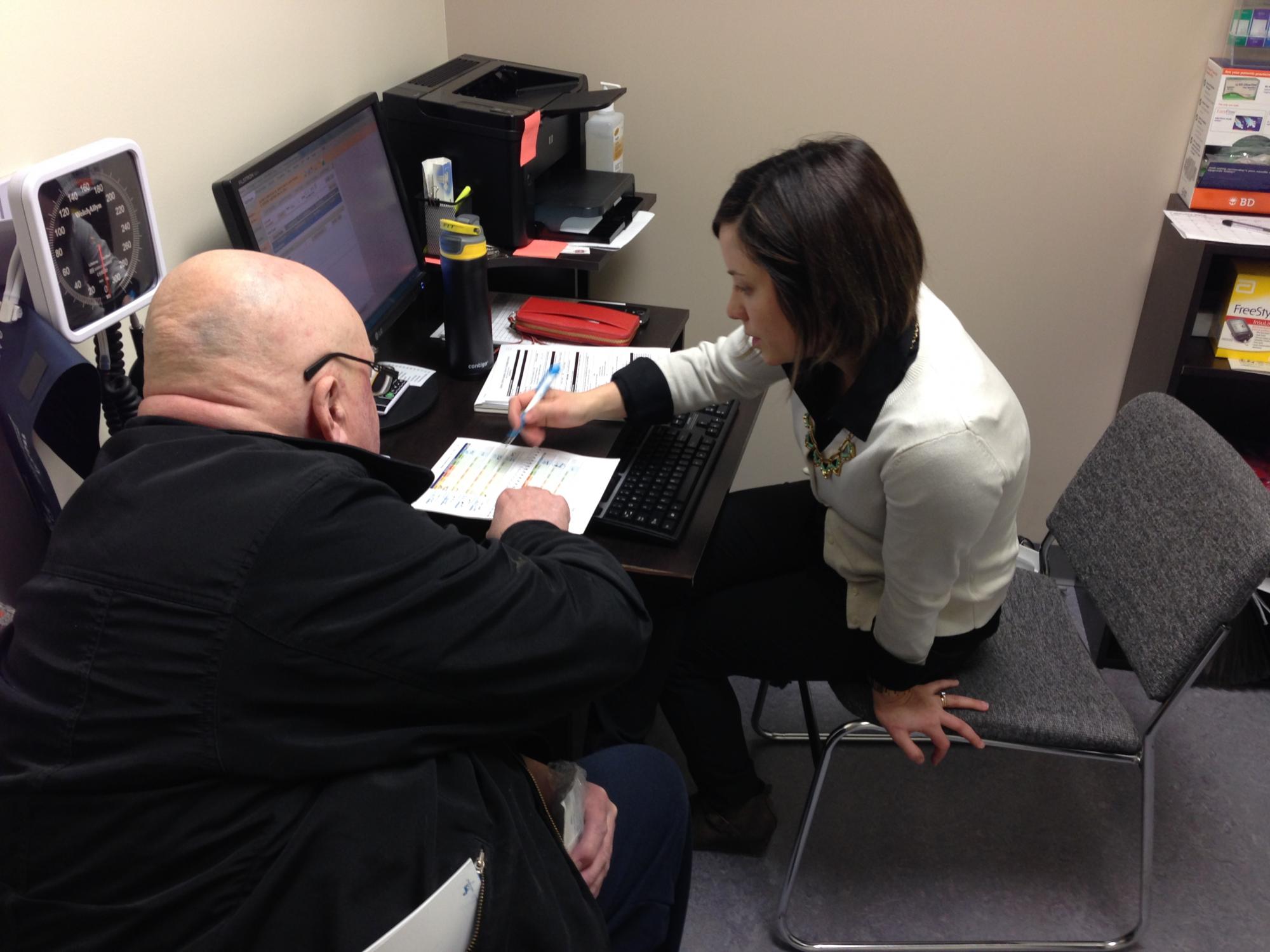Pharmacist and Certified Diabetes Educator Stacey Smith greats me in the waiting room at a medical clinic in Spryfield with a big welcoming smile and invites me to join her in her office. If it looks like any other doctor's office you may visit, it is because it is one. She shares the office with a doctor at the clinic. On the desk, there is a computer that gives her access to all the patient file information, including the results of blood tests. Stacey tells me that she has a patient who has agreed to let me sit in on his consultation if I am interested. Of course, I am.
Stacey's patient is an elderly gentlemen she has know for about a year. He is very comfortable with her and I can see he trusts her completely. While she reviews a special record book she has given him to record his daily glucose readings, she notices a spike in his recorded numbers.
The patient sheepishly admits that he had an unhealthy snack prior to taking the reading.
It's clear that Stacey knows this patient well.
"Chocolate bar or chips," asks Stacey.
"Both," the patient replies, looking at his feet.
They talk a little bit more about his glucose readings, the latest lab test results recorded in the computer system, and his lifestyle. Stacey tells him that she is not recommending a change in his insulin dosage at this point since the one spike can be explained by his choice of snack. Otherwise, his numbers are good. They further discuss how he can make positive changes, including exercise and diet, to improve his health. She weighs him to see how his diet is going. They also talk about some problems he has been having with his feet. Stacey takes a number of notes and the patient returns to the waiting room.
Stacey will have a chat with his family physician before the three of them will sit down to come up with an action plan to address some of the patient's concerns. Basically, Stacey gets the patient's medical history and the doctor performs a physical exam of the patient.
It's a fully collaborative practice, with each health care professional bringing their expertise to the table to benefit the patient. Stacey generally spends 30 minutes with each patient, reviewing their current health, the medications they are taking, and lifestyle issues.
Stacey came to the Spyfield clinic after the clinic's doctors reached out to the neighbouring pharmacy owner to see if he knew anyone who could help them with their patients with Diabetes. Stacey had worked for the pharmacy owner and he knew she would be a great fit for the position.
Almost one in four adult Nova Scotians have been diagnosed with Diabetes and, according to a report by the Canadian Diabetes Association, that number is only expected to grow.
"You don't feel Diabetes until it is too late," says Stacey. This is a very real challenge, so she also works with patients at the clinic who have been identified by the doctors at being at risk for developing the disease.
If a patient has already developed the disease, they become at risk for developing a host of other conditions.
"My role is to prevent Diabetes related complications," says Stacey.
There are a lot of moving parts when it comes to Diabetes and becoming a Certified Diabetes Educator requires a lot of self study and commitment. Certified Diabetes Educators must complete 600 hours of Diabetes care and pass a Board Certified National Exam. Additionally, they must recertify every five years.
When Stacey first became a pharmacist she worked in a busy retail pharmacy.
"I was there four years and patients still didn't know me," she says.
Now she rotates through eight clinics and has been able to build relationships with all her patients.
What is Stacey's favourite thing about her job?
"Building relationships with the patients and feeling that I have made a difference in their health outcomes," she says.
Stacey says that often the general public does not know that there is someone like her on staff at a doctor's office. She encourages patients to ask their family doctor or the receptionist at their clinic if they have a pharmacist or Certified Diabetes Educator on staff.
There are a number of chronic disease management courses a pharmacist can take and many areas they can specialize in. Stacey encourages pharmacists to look into these options if they are interested because she has never been happier for doing so.
"I pinch myself every day," says Stacey. "I love my job."

